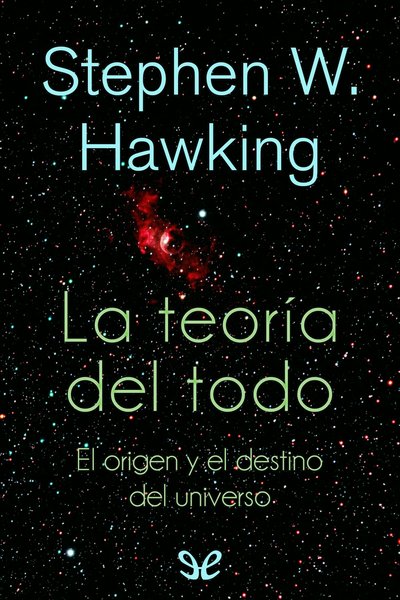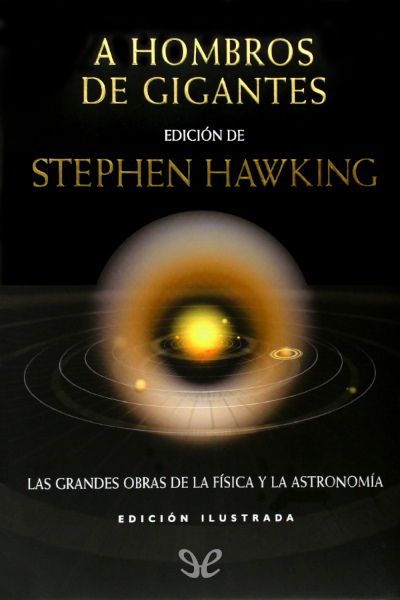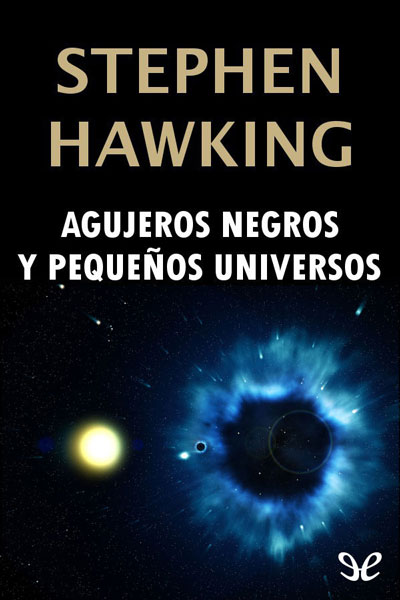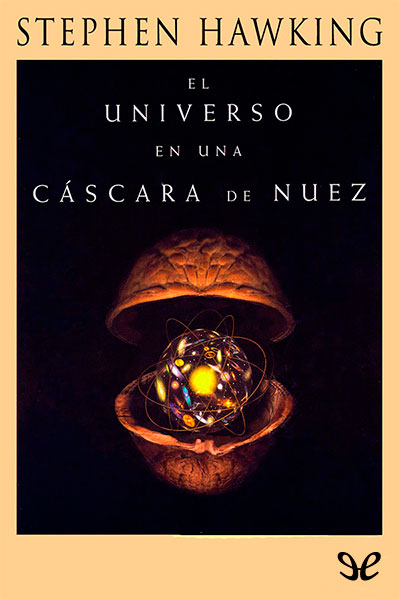oleebook.com
Breus respostes per a les grans preguntes de Stephen Hawking
de Stephen Hawking - GĂ©nero: Ciencias exactas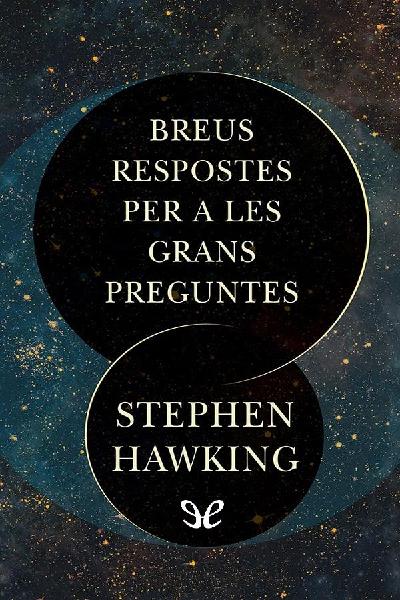
Sinopsis
Abans de la seva mort al març de 2018, Hawking estava treballant en el projecte dÂ’un llibre que recopilĂ©s les seves respostes a les «grans» qĂĽestions que se li plantejaven sovint i que oscil·laven mĂ©s enllĂ del seu camp acadèmic. Jugant a rememorar el tĂtol del seu llibre mĂ©s famĂłs, el llibre recull els Ăşltims pensaments de Hawkings respecte a les grans preguntes sobre lÂ’univers.
Amb la seva intel·ligència i humor caracterĂstics, sÂ’agrupen en quatre grans capĂtols: 1. Per què estem aquĂ? 2. Sobreviurem, els humans? 3. La tecnologia ens salvarĂ o ens destruirĂ ? 4. Com podem progressar?
El llibre inclou textos introductoris de pensadors reconeguts, com Neil De
Grasse, Sir David Attenborough o altres grans noms de col·laboradors o amics del fĂsic, i un text dÂ’Eddy Redmayne, lÂ’actor que va interpretar Hawking a The Theory of Everything.
Libros Recomendados - Relacionados
Reseñas Varias sobre este libro
A great book by a great man. I had heard the name Stephen Hawking but never read any of his theories. Simply for the very reason, the something coming from the smartest men of the previous 2 generations would be overly complicated and beyond my understanding. What I discovered in this book is Stephen Hawking. He was just a great man as we was a scientist, but an incredible teacher as well. His method of writing allows people , who have a passing interest in but only a vacation of his ability in science to understand his work. This skill can not be understated as if the most knowledgeable person in the world can not communicate their knowledge it is listed with them. Sort of sending it into a black hole.
The book is easily readable, Hawking' s dry wit and sense of humour makes reading and learning from it a pleasure. The metaphors in this book allowed me to grasp the basics of even the most complicated theories easily. Though I differ from him from a belief perspective, I do respect his ideas, and I think any great teacher, Hawking would have welcomed this difference of opinion as a show of curiosity towards finding the truth.
I am sure his views and more in-depth theories will go a long way towards solving many of the great worldwide problems highlighted in this book that we face today.
I would recommend this book to any. It is a great read, and I don't thingl9ved hj anyone can read this book without learning something from it or seeing something a different way. Also, it gives a great insight into Stephen Hawking as a person for people who know him best or colleagues of his, but from his own writing style. He has a great sense of humour and amazing determination. This is a great final word and goodbye to a man ? theories will inspire many and live on far into the future. One day, some of these theories might even become scientific laws one day.525 s Emily (Books with Emily Fox on Youtube)579 65k
Quick book answering some Big Questions while learning a bit more about Stephen Hawking.
Is there a God?
Is there other intelligent life in the universe?
Is time travel possible?
Will artificial intelligence outsmart us?
It was great - recommend the audiobook too!audiobooks263 s Florencia649 2,099
A few years ago, The Times newspaper ran a headline on the front page which said 'Hawking: God Did Not Create Universe'. The article was illustrated. God was shown in a drawing by Michelangelo, looking thunderous. They printed a photo of me, looking smug. They made it look a duel between us. But I don't have a grudge against God. I do not want to give the impression that my work is about proving or disproving the existence of God. My work is about finding a rational framework to understand the universe around us.
Catechist, atheist, agnostic; I've been there. So naturally, my main interest in this book is that haunting question regarding the existence of a god, the creation of things. I had faith, I don't know where it went; perhaps a part of it went with the books I've read that made it impossible for me to absorb some notions without questioning them. I told a priest once and he looked at me as if I were selling drugs and tickets to strip clubs at school, not without expressing how presumptuous human beings are for wanting to know everything. A similar reaction is mentioned in this book.
Needless remarks aside, a feeble faith tinged with fear - whereas it represents some obvious disadvantages - keeps the mind open. What do you have? The laws of nature or a self-existent and eternal being that created time and space. The complete absence of destiny or someone to blame for lousy decisions. The serenity of dust or the afterlife - on whichever side you get, because you believe or you don't. There is no wager here. There's a chance that an omniscient designer is going to notice that you're believing "just in case". I prefer the afterlife Hawking describes: wishful thinking.
This scientist, key factor in singularities and father of Hawking Radiation, is also the master of analogies. The content of this book is a pedagogic challenge and yet, he makes it approachable. Some ideas and quotes appear more than once throughout the book (those already familiar with Hawking's work may be less enthusiastic about this) but I didn't mind; more resources for me to retain rather complex processes, while there's still light.
Some of the Big Questions and one-sentence quotes:
Is there a God?
If you accept, as I do, that the laws of nature are fixed, then it doesn't take long to ask: what role is there for God?
How did it all begin?
We are the product of quantum fluctuations in the very early universe.
Is there other intelligent life in the universe?
I shall take this [intelligent life] to include the human race, even though much of its behaviour throughout history has been pretty stupid and not calculated to aid survival of the species.
What is inside a black hole?
Black holes are stranger than anything dreamed up by science-fiction writers, but they are firmly matters of science fact.
Is time travel possible?
There was a young lady of Wight
Who travelled much faster than light
She departed one day
In a relative way
And arrived on the previous night.
How do we shape the future?
If you know how something works, you can control it.
The book includes comments of those who knew Hawking: teacher, mentor and friend.
Oct 27, 18
* Also on my blog.
** Photo credit: NASA/CXC/M.Weissnon-fiction154 s1 comment Valeriu GherghelAuthor 6 books1,717
Nu pot pretinde c? st?pînesc vocabularul unui fizician teoretic, a?a încît nu am priceput unele sintagme. În pofida ?tiin?ei mele aproximative, r?spunsurile la cele 10 întreb?ri fundamentale mi s-au p?rut limpezi. De ce trebuie s? le punem? A?a, pur ?i simplu, pentru c? sîntem fiin?e foarte curioase, fiindc? avem meteahna de a ne mira ?i dorin?a de a cunoa?te. Iar dorin?a e o excelent? justificare a c?ut?rii noastre.
Voi lua întreb?rile pe rînd ?i voi rezuma r?spunsurile a?a cum le-am în?eles.
1. Exist? Dumnezeu? Datele fizicii ?i întreaga cosmologie arat? c? universul a ap?rut din nimic, mai precis, dintr-o „singularitate” (un punct de o densitate infinit?, p.99). Dumnezeu e o ipotez? inutil?. Din p?cate pentru specia uman?, „nimeni nu a creat universul ?i nu ?ine nimeni în mîini soarta noastr?” (p.52). Trebuie s? ne descurc?m singuri.
2. Cum a început totul? Cu o singularitate (p.61). Hawking nu a acceptat aceast? ipotez? cu pl?cere. Autorul invoc? ?i în acest capitol a?a-zisul „principiu antropic”. Dac? universul ar fi avut alte constante fizice ?i chimice, con?tiin?a nu s-ar fi ivit. Pornind de la faptul c? numai aici a ap?rut o con?tiin??, ea poate fi v?zut? ca finalitatea evolu?iei. O formulare a a acestui argument: „Principiul antropic spune c? universul trebuie s? fie într-o m?sur? mai mare sau mai mic? exact a?a cum este, pentru c?, dac? ar fi altfel, atunci nu ar exista nimeni care s?-l observe” (p.65). Unii au crezut c? principiul antropic e o „dovad?” a existen?ei lui Dumnezeu, a faptului c? evolu?ia urmeaz? un plan prescris. Nu poate fi.
3. Exist? ?i alt? via?? inteligent? în univers? Pu?in probabil. Dac? exist?, am fi aflat deja.
4. Putem prezice viitorul? E vorba, fire?te, de viitorul lumii fizice. Principiul de incertitudine complic? infinit r?spunsul. Credin?a lui Laplace c? viitorul poate fi prezis cu maxim? rigurozitate nu e realizabil? (p.91).
5. Ce se afl? în interiorul unei g?uri negre? Numai Dumnezeu poate ?ti. Destul de imprecis spus, o gaur? neagr? este o stea care s-a mic?orat pîn? la dimensiunea zero. Acolo cîmpul gravita?ional este atît de puternic, încît lumina nu mai poate evada din h?uri.
6. E posibil? c?l?toria în timp? Nu. Ar contrazice legile fizicii. Pentru a c?l?tori în timp, omul are nevoie de o nav? cu o vitez? mai mare decît cea a luminii (p.119). Prin urmare, „legile fizicii conspir? ca s? împiedice c?l?toria în timp” (p.128).
7. Vom supravie?ui pe P?mînt? Greu de spus. Hawking e îngrijorat. O catastrof? ecologic? (dac? nu una nuclear?), apari?ia superinteligen?ei rebele par inevitabile. Omul trebuie s? se gîndeasc? la o modalitate de a evada de pe P?mînt (p.134).
8. Ar trebui s? coloniz?m spa?iul? Neap?rat. Resursele sînt tot mai pu?ine.
9. Ne va dep??i inteligen?a artificial?? Într-o carte anterioar?, Hawking minimaliza problema: „calculatorul actual nu dep??e?te inteligen?a unei rîme”. Nu mai e deloc a?a. ?i nu mai e mult pîn? cînd intelectul uman va fi dep??it de IA. Stephen Hawking crede c? acest fapt se va petrece în urm?toarea sut? de ani. Ce se va întîmpla dac? inteligen?a artificial? „va dezvolta o voin?? proprie”? (p.162). De ce ar respecta preceptele etice? Superinteligen?a (despre care filosoful suedez Nick Bostrom a scris o carte foarte interesant?, în 2014) este o amenin?are redutabil?.
10. Cum model?m viitorul? Prin imagina?ie ?i creativitate (p.173). Din p?cate, „asist?m la o revolt? global? împotriva exper?ilor” (p.174). A?adar, problema nu e cum s?-l model?m, problema e dac? mai avem un viitor...
O carte instructiv? ?i folositoare.
P. S. Am întîlnit probleme de corectur? la pp. 34, 56, 77, 139.167 s4 comments Sean Barrs 1,122 46.6k
“While there’s life, there is hope.”
Stephen Hawking was such an inspirational man. When he first received his diagnosis, he was ready to give up on life; he was ready to abandon his studies as his body slowly diminished, but with the help of a few friends and loved ones he managed to carry on and complete his work. And, to his surprise, he carried on living beyond what he thought was capable. So, he made the most of every moment as he pursued his academic goals.
“Be brave, be curious, be determined, overcome the odds. It can be done”
He truly was a great man. And the best thing about this book is its simplicity. Stephen Hawking is not dealing with simple things here; he is dealing with complexities that he has spent his life researching and pondering over. Yet, for all that, he makes it approachable and readable to the everyday reader. He knows his audience, and he writes for them, which is fantastic because with a book this one could easily have become alienated. He was the leading expert in his field of theoretical physics, but he knew exactly how to communicate his ideas to the public.
And that is so important. He considers huge questions in this book. Questions about time travel and alternate universes, but he discusses them in a friendly way. Anybody could read this without getting lost. I really do recommend this one.
ItÂ’s a book that will make you think, and itÂ’s a book that will make you appreciate one of the greatest scientists of his generation.5-star-reads114 s Barbara1,500 5,140
Stephen Hawking
Stephen Hawking was an English theoretical physicist and cosmologist who's considered one of the most brilliant scientists since Albert Einstein. In addition to making huge contributions to physics, Hawking strove to share his discoveries with the general public, and his book "A Brief History of Time" was a best seller. Moreover, Hawking did most of his research while battling amyotrophic lateral sclerosis, which makes his accomplishments even more remarkable.
In 'Brief Answers to Big Questions', completed after Hawking's death (from his speeches, interviews, essays, notes and lectures), the gifted scientist responds to a number of queries that are relevant to our time.
However it's Hawking's QUESTIONS about relativity and quantum mechanics that will resonate going forward. In the introduction to this book, American theoretical physicist and Nobel laureate Kip Thorne writes: "Newton gave us answers, Hawking gave us questions. And Hawking's questions themselves keep on giving, generating breakthroughs decades later. When ultimately we master the quantum gravity laws and comprehend fully the birth of our universe it may largely be by standing on the shoulders of Hawking."
Kip Thorne is an American theoretical physicist and Nobel laureate, known for his contributions in gravitational physics and astrophysics.
One of Hawking's most important contributions to science was his discovery of 'Hawking Radiation', composed of particles emitted from black holes. It was once thought that NOTHING could escape from a black hole, but this isn't the case. The idea goes as follows: Quantum mechanics implies that space is filled with particles and anti-particles - which are constantly appearing in pairs, separating, them coming together again and annihilating each other. In the presence of a black hole one member of the pair may fall into the black hole, leaving the other member without a partner to engage in mutual annihilation. This particle (or anti-particle) may escape as 'radiation' from the black hole.
Sketches depicting Hawking Radiation
Scientists speculate that, unless a black hole gains mass (by engulfing other objects), it will eventually vanish.
*****
In this book Hawking answers questions he's been asked over the years. I'll give a brief synopsis of his responses, and leave you to read the book if you want more information.
- Is there a God?
No. Everything can be explained by the laws of nature. Matter and energy and space were spontaneously created by the Big Bang.
- What came before the Big Bang?
This is a meaningless question because there was no 'before' the Big Bang. Time (actually spacetime) was created BY the Big Bang. It's asking 'what is south of the South Pole?'
Spacetime (which is warped by the presence of solid matter) was formed by the Big Bang
There's no 'south' of the South Pole
- Is there other intelligent life in the universe?
We don't know (yet) but Hawking s to think there are other forms of intelligent life out there. They just haven't contacted Earth....perhaps because they're too far away.
In any case, meeting an advanced civilization would be unadvisable (for us). Remember European settlers and American Indians? If aliens came here it would be the film 'Independence Day.'
- Can we predict the future?
No. The Heisenberg Uncertainty Principle dictates that we can't know both the position and momentum of a particle at the same instant. Thus we can't predict what will happen to a particle (or things made of particles) at a future time. Hawking observes: “No matter how powerful a computer you have, if you put lousy data in you will get lousy predictions out.”
- What is inside a black hole?
A black hole - which is single point of infinite density - is a star that's exhausted its nuclear fuel and collapsed.....but no one REALLY knows what's inside.
- Is time travel possible?
Theoretically yes. If spacetime was warped enough to form a loop, time travel would be possible. However, it time travel WAS possible, someone from the future would probably have come back to visit us already.
In 2009, Hawking held a party for time travelers in his college at Cambridge, for a film about time travel. No one came.
Autor del comentario:
=================================

